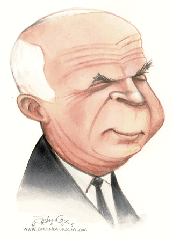 It's said that "A country gets the political leaders it deserves." What then does the candidacy of Barack Obama say about America, and what's happened to it in the last thirty-seven years? Lindsay Perigo looks to an essay written by philosopher Ayn Rand just before the 1972 American presidential election, in which she drew a crucial distinction between the European and American sense of life and implored readers, "Don't Let it Go!"
It's said that "A country gets the political leaders it deserves." What then does the candidacy of Barack Obama say about America, and what's happened to it in the last thirty-seven years? Lindsay Perigo looks to an essay written by philosopher Ayn Rand just before the 1972 American presidential election, in which she drew a crucial distinction between the European and American sense of life and implored readers, "Don't Let it Go!"
"The emotional keynote of most Europeans is the feeling that man belongs to the State," she noted, "as a property to be used and disposed of, in compliance with his natural, metaphysically determined fate. ... A typical American can never fully grasp that kind of feeling. An American is an independent entity. ... Emotionally, an American has no concept of service (or of servitude) to anyone. Even if he enlists in the army and hears it called 'service to his country,' his feeling is that of a generous aristocrat who chose to do a dangerous task."
A year later, Democratic presidential nominee George McGovern proposed giving every American $1000 a year, raising taxes on income over $12,000 and virtually confiscating income over $75,000.
Proving Rand right, McGovern was buried in a landslide.
Thirty-seven years of ongoing philosophical corruption later, and Day One of the 2008 Democratic Party Convention is an orgy of Eurofascism....
"The difference between 1972 and 2008," says Perigo, "is that Barack Obama won't be buried in a landslide; he's more likely to be elected in one." The American sense of life that saved it from McGovern's collectivist state worship? Gone, says Perigo, buried by "generations of cultural corruption." Read his analysis here. It's one of his best pieces. (Head here to understand what Ayn Rand means by sense of life.)
 But what of McCain? Given that the candidate who buried McGovern in a landslide was Richard Nixon, don't things look a little better now? No, not really. As Rand pointed out at the time, the landslide defeat of McGovern was not an overwhelming vote of approval either for Nixon -- "Nixon is not a popular President" -- or for his policies -- "these are so contradictory that approval on some issues necessitates disapproval on others." It was a vote on a single point, "a matter of a single, fundamental issue: the imperative necessity to defeat George McGovern, i.e., statism.
But what of McCain? Given that the candidate who buried McGovern in a landslide was Richard Nixon, don't things look a little better now? No, not really. As Rand pointed out at the time, the landslide defeat of McGovern was not an overwhelming vote of approval either for Nixon -- "Nixon is not a popular President" -- or for his policies -- "these are so contradictory that approval on some issues necessitates disapproval on others." It was a vote on a single point, "a matter of a single, fundamental issue: the imperative necessity to defeat George McGovern, i.e., statism.
For once, people had an opportunity to vote on an abstract principle and on a long-range issue—though they were guided not by full, conscious knowledge, but by their sense of life. In a way, McGovern deserves a grim kind of negative credit: he did make the issue clear—even though he spent the entire campaign struggling to evade, disguise and deny it. But a sense of life is impervious to sophistry—it responds only to essentials. What people grasped was not merely the explicit content of McGovern's program, but the emotional vibrations he projected; not merely his gross defiance of individual rights, but the fact that he seemed unaware of there being anything there to defy—as demonstrated by his casual proposals to redistribute wealth, to limit income, to bribe the entire nation with thousand-dollar handouts, and to disarm unilaterally.
American voters "saw the obscene spectacle of altruism's essence: sacrifice and surrender," she says, and they rejected it utterly. (Unfortunately what they embraced instead was not what the dishonesty of pragmatism, but that's another story.) This election they won't have that opportunity.
Both McCain and Obama are unfortunately cut from very similar cloth -- both of them thrown up as perfect expressions of the new 2008 sense of life -- or lack thereof. As Edward Cline has pointed out (see Cline's thorough three-part analysis here, here and here), they both offer up the same sacrifice and surrender syrup. When asked to define themselves, what is missing from both "is any reference to the freedom, political liberty, or individual rights that made America's enormous wealth and scientific achievements possible" -- and what both replace that with are references to sacrifice as both "a moral imperative" and "a touchstone of moral virtue."
"For all [McCain's] purported 'patriotism' for America," says Cline, "he is not by any measure a friend of life, liberty, property and the pursuit of happiness."
This election, then, American voters have the choice between (to use the terms proposed by a commenter here) either a sacrifice-worshipping statist or a multiculturalist New Lefitist America-hater. Which is to say, they now have the candidates they deserve. Unfortunately.
2 comments:
No, it isn't. It is still shared by millions. You may have to dig a little, but it's there. Read Powerline. Read HotAir. Read RealClearPolitics.
Perfect? Far from it. 1789? Not by a long shot. But still alive and kicking, despite being virtually ignored by the major news outlets, popular TV shows, and the like.
If Mr. Perigo believes it's gone, he needs to pay less attention to who is running for President, admittedly a sad lot (how often has it been otherwise in the past 90 years?), and more to what the general public says.
Yes, creatures like Britney Spears and Paris Hilton are all too popular. But they are widely derided, too.
Yes, it is grotesque that a thing like Obama the Zero is roughly tied and has the ear of millions of adoring zombies (McGovern did pretty well until late in the day, too).
But, there are still plenty of real Americans left. I know. I live here and I read more U.S. publications daily than six New Zealanders put together.
Mr. Perigo and Mr. Creswell both have legitimate and insightful beefs about America and its decline. I share many of them. But this country, hobbled as it is, is still great. And a lot of that is thanks precisely to the enduring American sense of life.
Something that struck me forcibly when I was in the States Jeff was the enormous contrast between the popular view of the U.S. and the reality.
It's the fringe loonies who get all the news coverage, but in small-town America life just seems to jog along pretty placidly.
And the kindness and friendliness of the people I met was amazing.
Post a Comment